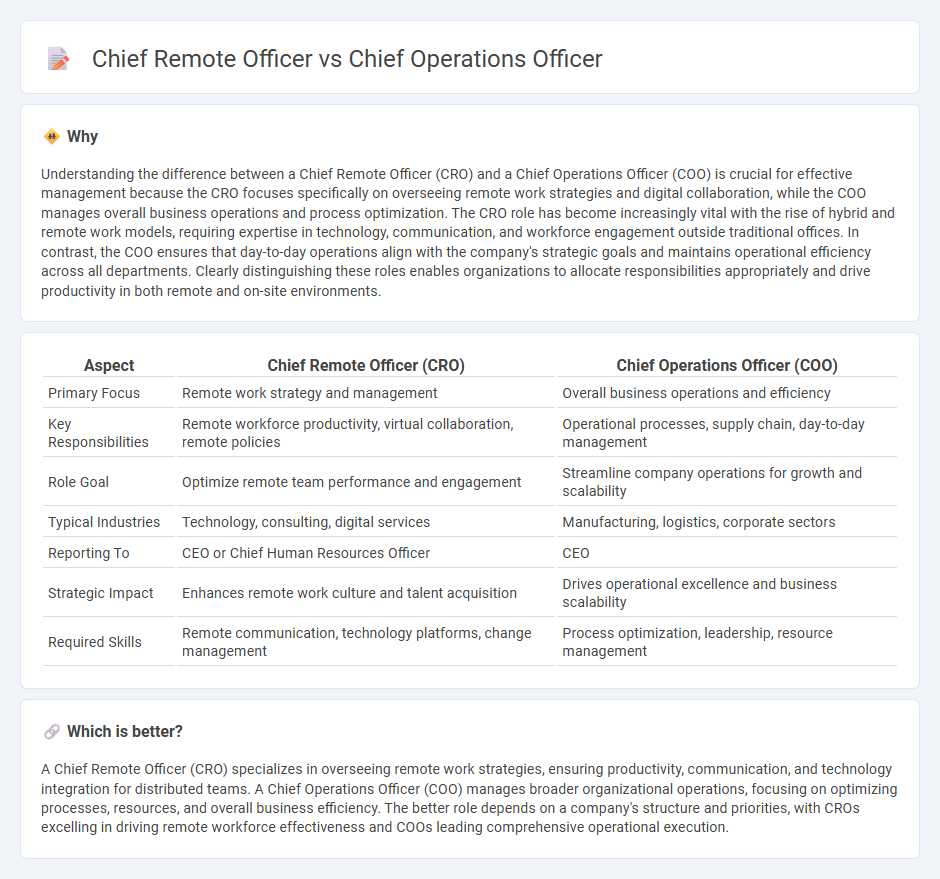
The Chief Remote Officer (CRO) specializes in overseeing remote workforce strategies, ensuring seamless virtual collaboration, productivity, and employee engagement across dispersed teams. The Chief Operations Officer (COO) manages overall organizational operations, focusing on process optimization, resource allocation, and daily business performance to drive company growth. Explore more to understand how these leadership roles uniquely impact modern business management.
Why it is important
Understanding the difference between a Chief Remote Officer (CRO) and a Chief Operations Officer (COO) is crucial for effective management because the CRO focuses specifically on overseeing remote work strategies and digital collaboration, while the COO manages overall business operations and process optimization. The CRO role has become increasingly vital with the rise of hybrid and remote work models, requiring expertise in technology, communication, and workforce engagement outside traditional offices. In contrast, the COO ensures that day-to-day operations align with the company's strategic goals and maintains operational efficiency across all departments. Clearly distinguishing these roles enables organizations to allocate responsibilities appropriately and drive productivity in both remote and on-site environments.
Comparison Table
| Aspect | Chief Remote Officer (CRO) | Chief Operations Officer (COO) |
|---|---|---|
| Primary Focus | Remote work strategy and management | Overall business operations and efficiency |
| Key Responsibilities | Remote workforce productivity, virtual collaboration, remote policies | Operational processes, supply chain, day-to-day management |
| Role Goal | Optimize remote team performance and engagement | Streamline company operations for growth and scalability |
| Typical Industries | Technology, consulting, digital services | Manufacturing, logistics, corporate sectors |
| Reporting To | CEO or Chief Human Resources Officer | CEO |
| Strategic Impact | Enhances remote work culture and talent acquisition | Drives operational excellence and business scalability |
| Required Skills | Remote communication, technology platforms, change management | Process optimization, leadership, resource management |
Which is better?
A Chief Remote Officer (CRO) specializes in overseeing remote work strategies, ensuring productivity, communication, and technology integration for distributed teams. A Chief Operations Officer (COO) manages broader organizational operations, focusing on optimizing processes, resources, and overall business efficiency. The better role depends on a company's structure and priorities, with CROs excelling in driving remote workforce effectiveness and COOs leading comprehensive operational execution.
Connection
The Chief Remote Officer (CRO) and Chief Operations Officer (COO) collaborate closely to streamline remote work strategies and operational efficiency within organizations. The CRO focuses on optimizing remote workforce performance, while the COO ensures that remote operations align with overall business objectives and processes. Their synergy enhances productivity, employee engagement, and seamless execution of company goals in a hybrid or fully remote environment.
Key Terms
Chief Operations Officer:
The Chief Operations Officer (COO) oversees a company's day-to-day administrative and operational functions, ensuring efficient workflow and strategic alignment across departments. This role emphasizes optimizing processes, managing resources, and driving execution of business plans to achieve organizational goals. Discover how a COO's expertise can transform operational efficiency and business growth.
Process Optimization
The Chief Operations Officer (COO) oversees overall company processes, ensuring operational efficiency and strategic alignment across departments. In contrast, the Chief Remote Officer (CRO) specializes in optimizing processes specifically for remote work environments, focusing on virtual collaboration, decentralized management, and remote team productivity. Discover how each role drives process optimization in modern enterprises to enhance performance and scalability.
Resource Allocation
The Chief Operations Officer (COO) primarily oversees resource allocation by optimizing internal processes, managing budgets, and ensuring efficient use of personnel and assets to drive company-wide performance. In contrast, the Chief Remote Officer (CRO) focuses on strategically allocating resources to support remote work infrastructure, including technology investments, virtual collaboration tools, and remote employee engagement initiatives. Explore the distinct approaches each executive takes to resource allocation in evolving workplace environments to understand their impact on organizational success.
Source and External Links
Chief Operating Officer (COO): Role and Responsibilities | Indeed.com - The COO is a senior executive overseeing daily operations like manufacturing, sales, and personnel, reporting to the CEO and turning strategy into action.
Chief Operations Officer (COO) Job Description & Template - The COO leads operational strategy, manages daily company functions to boost efficiency and growth, and works closely with the executive team to implement strategic initiatives.
Chief operating officer (COO): job role, education, and salary - The COO transforms the CEO's vision into operational reality by managing daily processes, aligning resources, and driving growth through strategy execution and performance optimization.
 dowidth.com
dowidth.com